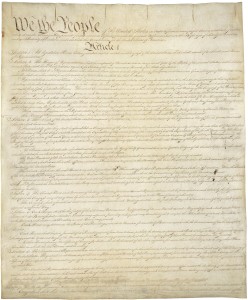By Kelsey Mellan
On January 26, 2017, the Fourth Circuit issued a published opinion in United States v. Moreno-Tapia, a constitutional appeal of an immigration removal and sentencing order. Juan Moreno-Tapia (“Moreno-Tapia”) argued he was unconstitutionally deported in 2009 and thus his conviction for illegal reentry into the United States in 2014 was also unconstitutional. The Supreme Court case in which Moreno-Tapia based his constitutional argument on was decided in 2010. The Fourth Circuit determined that this particular case does not apply retroactively. Therefore, the Fourth Circuit affirmed the district court’s denial of Moreno-Tapia’s motion to vacate his removal order and sentencing determination.
Facts & Procedural History
Moreno-Tapia immigrated to the US from Mexico when he was a child. While he applied for legal permanent residency, the process never advanced due to his eventual removal from the US. In 2006, Moreno-Tapia was charged in a North Carolina court with three counts of felony indecent liberties with a child. At the time of his plea, Moreno-Tapia was aware that he would have to register as a sex offender. However, he claimed his attorney did not inform him that he would be subject to deportation because of his convictions. Shortly after Moreno-Tapia was released from prison in 2009 for these charges, he was deported to Mexico pursuant to a removal order from the Department of Homeland Security. Between 2009 and 2011, Moreno-Tapia reentered the US without permission and returned to North Carolina. He failed to register as a sex offender, despite his convictions for a qualifying sex offense. He was subsequently arrested for an unrelated crime. Because of that arrest, the authorities became aware of his current illegal presence in the US.
In June 2014, Moreno-Tapia was indicted in the Middle District of North Carolina on the charges of illegal reentry by a removed alien and failure to register as a sex offender. Moreno-Tapia pleaded guilty to the illegal reentry charge, and the government agreed to dismissal of the failure to register charge. After these proceedings, Moreno-Tapia returned to North Carolina court and filed a Motion for Appropriate Relief (“MAR”) seeking to vacate his state indecent liberties convictions. He relied on Padilla v. Kentucky to argue that his convictions should be set aside because his lawyer’s failed to inform him of the immigration consequences of his guilty plea – so the plea was not knowing and voluntary. The North Carolina court agreed and vacated his indecent liberties convictions.
Moreno-Tapia then returned to the district court to challenge the removal order on which his illegal reentry charge was based, pursuant to the North Carolina state court decision. He moved to vacate the 2009 removal order and to dismiss both counts of the indictment against him – illegal reentry and failure to register. The district court denied all of Moreno-Tapia’s motions. In September 2015, the district court held a sentencing hearing on the illegal reentry charge using the vacated indecent liberties convictions as the basis for his offense level under the federal Sentencing Guidelines. He was eventually sentenced to 27 months’ imprisonment. This timely appeal follows.
Motion to Vacate the Removal Order
The core issue in this case was whether Moreno-Tapia’s removal order should be vacated, without which he may not be convicted of illegal reentry. Moreno-Tapia’s main argument was that because his lawyer failed to inform him of the immigration consequences of his guilty plea to the indecent liberties charge, the subsequent removal order and reentry charges are unconstitutional. As previously mentioned, he relied on Padilla for the proposition that without this information, the North Carolina state court rightly overturned the original conviction.
However, the Fourth Circuit determined lawyers have no duty to advise aliens of potential legal infirmities in prior criminal proceedings. Thus, his state convictions were constitutionally infirm. However, Moreno-Tapia pleaded guilty in the 2006 case, which was 4 years before the Supreme Court’s decision in Padilla. Because the Supreme Court subsequently decided in Chaidez v. United States that Padilla does not apply retroactively, any failure by Moreno-Tapia’s lawyer to warn him of the possible immigration consequences of his guilty plea would not render Moreno-Tapia’s convictions constitutionally unsound.
That the state MAR court vacated Moreno-Tapia’s convictions under Padilla did not change the Fourth Circuit’s analysis because the state court erroneously applied Padilla retroactively. Thus, there was no federal constitutional violation on which Moreno-Tapia could have based his argument here.
Motion to Vacate the Sentencing Determination
The Sentencing Guidelines on which Moreno-Tapia’s 27-month sentence was based provides for sentence enhancements based on specific offense characteristics. The relevant guideline here, § 2L1.2, imposes an enhancement to the offense level of a defendant who “previously was deported after a conviction for a crime of violence.” Moreno-Tapia argues that because his convictions were vacated after his removal and illegal reentry, they should not have been taken into account at sentencing. In United States v. Moran-Rosario, this court held that eh relevant time for determining whether a prior conviction qualifies for enhancement under § 2L1.2 is the date of the defendant’s deportation and not the date of the subsequent illegal reentry charge or sentencing. Moreno-Tapia argued there should be an exception to this rule if the prior conviction was vacated as a result of a constitutional infirmity, egregious error of law, or determination of innocence. However, the Fourth Circuit determined it had no occasion to decide on this issue in this case. As previously mentioned, because Padilla does not apply retroactively, Moreno-Tapia’s state convictions were constitutionally obtained.
Disposition
Therefore, the Fourth Circuit affirmed the district court’s denial of Moreno-Tapia’s motion to vacate both the removal order and sentencing determination.












